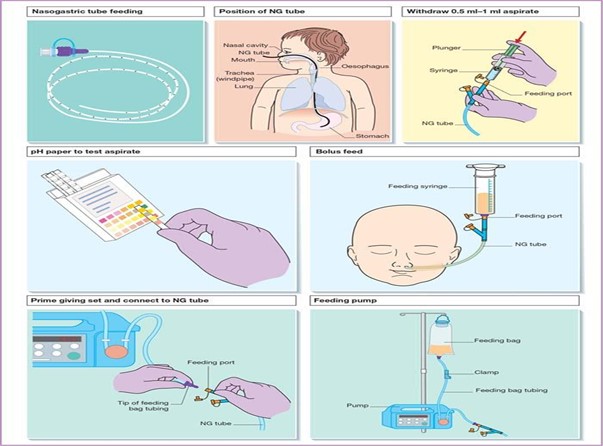The charge nurse observes a newly hired nurse who is preparing to insert a nasogastric tube. Which action by the charge nurse takes priority?
Demonstrate correct measurement of the tube insertion length.
Remind the nurse to apply lubricant to the tube before insertion.
Confirm that the nurse has auscultated the client's bowel sounds.
Elevate the head of the bed before the nurse inserts the tube.
The Correct Answer is A
Choice A
Demonstrating correct measurement of the tube insertion length is the first priority. Inserting a nasogastric tube to the appropriate length is crucial for ensuring that the tube reaches the stomach and is not inserted too far. Incorrect insertion length can lead to complications, discomfort, or potential harm to the patient. Therefore, demonstrating and ensuring the correct measurement of the tube insertion length takes priority.:
Choice B
Reminding the nurse to apply lubricant to the tube before insertion is not first priority. Applying lubricant helps ease the insertion process, but it is not the most critical step to prioritize initially.
Choice C
Confirming that the nurse has auscultated the client's bowel sounds is not the first priority. Bowel sounds assessment is important to ensure proper placement, but this step can be done after ensuring the correct measurement of the insertion length.
Choice D
Elevating the head of the bed before the nurse inserts the tube is not the first priority: Elevating the head of the bed helps facilitate the passage of the tube into the stomach, but it is not the first priority in this context.

Nursing Test Bank
Naxlex Comprehensive Predictor Exams
Related Questions
Correct Answer is B
Explanation
Choice A
Potatoes are incorrect. Potatoes are high in carbohydrates and can cause a rapid increase in blood sugar levels, so they are not the best choice for someone with diabetes trying to avoid refined sugars and carbs.
Choice B
Avocado is correct. Avocado is a good choice for someone with Type 2 diabetes who wants to avoid refined sugars and carbohydrates. Avocado is a healthy source of monounsaturated fats, fibre, and various vitamins and minerals. It has a low glycaemic index and doesn't significantly raise blood sugar levels, making it a suitable option for people with diabetes.
Choice C
Grapes are incorrect. Grapes are a fruit with natural sugars, and although they contain fibre, they can still cause spikes in blood sugar levels.
Choice D
Pretzels are incorrect. Pretzels are usually made from refined flour and are high in simple carbohydrates, causing rapid spikes in blood sugar levels. They are not a good choice for someone with diabetes aiming to avoid refined sugars and carbs.
Correct Answer is D
Explanation
Choice A
Cutting the spaghetti and meatballs into small pieces is inappropriate. This choice is not directly related to the risk of infection. It might be helpful for a client who has difficulty swallowing or chewing, but it doesn't address the compromised immune system and infection risk.
Choice B
Exchanging pasteurized whole milk with skim milk is inappropriate. The type of milk doesn't have a direct impact on infection risk. Both pasteurized whole milk and skim milk are considered safe for consumption. This choice doesn't address the specific concern of infection in a client with a low ANC.
Choice C
Substituting fried potatoes with a garden salad is inappropriate. While choosing healthier food options can be beneficial for overall health, the choice between fried potatoes and a garden salad doesn't necessarily impact the infection risk for a client with a low ANC. This choice also doesn't address the specific concern of infection in this context.
Choice D
Remove the fresh grapes from the meal tray is appropriate. The reason for this choice is that a client with an absolute neutrophil count (ANC) of 400 has a significantly compromised immune system, and they are at a high risk of infection due to their low neutrophil count. Neutrophils are a type of white blood cell that plays a crucial role in fighting off infections. A normal ANC falls within the range of 2500 to 8000 mm3 or cells/uL.
Fresh grapes, being a raw and uncooked food item, may carry a higher risk of containing bacteria or pathogens that could pose a threat to a client with such a low ANC. The nurse needs to ensure that the client's exposure to potential sources of infection is minimized.
Whether you are a student looking to ace your exams or a practicing nurse seeking to enhance your expertise , our nursing education contents will empower you with the confidence and competence to make a difference in the lives of patients and become a respected leader in the healthcare field.
Visit Naxlex, invest in your future and unlock endless possibilities with our unparalleled nursing education contents today
Report Wrong Answer on the Current Question
Do you disagree with the answer? If yes, what is your expected answer? Explain.
Kindly be descriptive with the issue you are facing.
